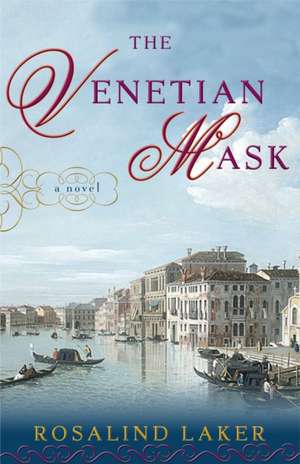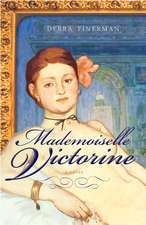The Venetian Mask
Autor Rosalind Lakeren Limba Engleză Paperback – 29 feb 2008
In 1775 Venice–known to outsiders as “the brothel of Europe”–the tradition of mask-wearing has allowed adultery and debauchery to flourish. But Marietta and Elena, two dear friends at the Ospedale della Pietà, a world-famous orphanage and music school for girls, know little of that milieu–until they come of age.
Elena is forced to wed the head of the Celano clan, a jealous, brutal man, while Marietta marries Domenico Torrisi, whose family vendetta with the Celanos is centuries old. Tradition dictates that the friends should never speak again, but their bond is too strong to break.
As the French Revolution unsettles all of Europe, Elena’s husband frames Domenico and he becomes a political prisoner. Marietta and Elena plot to save him, and the women discover that Venetian masks have noble purposes, too–but will their efforts put their own lives at risk?
Embodying the glitter and the treachery of the city it portrays, The Venetian Mask will keep you turning pages long into the night.
Preț: 110.76 lei
Nou
Puncte Express: 166
Preț estimativ în valută:
21.20€ • 23.04$ • 17.82£
21.20€ • 23.04$ • 17.82£
Carte disponibilă
Livrare economică 31 martie-14 aprilie
Preluare comenzi: 021 569.72.76
Specificații
ISBN-13: 9780307352569
ISBN-10: 0307352560
Pagini: 453
Dimensiuni: 132 x 202 x 25 mm
Greutate: 0.32 kg
Ediția:Pbk.
Editura: Three Rivers Press (CA)
ISBN-10: 0307352560
Pagini: 453
Dimensiuni: 132 x 202 x 25 mm
Greutate: 0.32 kg
Ediția:Pbk.
Editura: Three Rivers Press (CA)
Notă biografică
ROSALIND LAKER is the author of many novels, including To Dance with Kings and The Golden Tulip. She lives in England.
Extras
Chapter One
Marietta raised the velvet-covered lid of the box. Immediately her green eyes widened at the sight of the full-faced golden mask that shone from its bed of black satin. A strange shiver passed down her spine.
“Who has ordered this mask, Mama?” she asked almost warily, recalling that a few days ago she had seen her widowed mother, an outworker for a shop in distant Venice, give it a second coat of a certain rust-red paint in preparation for its gilding. Then it had been just another mask among so many in the workroom, but now, newly returned from the gilder, it had somehow leapt into life. Its strong male features showed a forceful nose, deeply indented chin, wide planes across the brow and cheekbones, and a well-cut mouth.
“I know nothing about the purchaser, except that the base was molded from a sculpture of his face.” Cattina Fontana looked up slowly from stitching sequins to a mask, every movement an effort in her poor state of health, and her gaze lingered fondly on her twelve-year-old daughter.
“Why would anyone want his own likeness in a mask?” Marietta continued to be uneasily intrigued. Masks were to conceal, not to reveal the wearer’s identity.
“It will be for fashionable occasions, when everyone knows the young man, not a mask for disguise. I expect he has a host of those and wanted an exclusive one with which to impress his friends.”
“How do you know he’s young?”
“I don’t,” Cattina admitted, “but it’s the kind of novelty that would appeal to a youth in Venice. Now add the tie-ribbons to it as I asked you.”
Cattina returned to her sewing, her hands trembling with weakness. A persistent cough had drained all her energy over the past several months. Although her illness had given her a greyish pallor and hollowed her eyes, it could not change the facial bone structure that had made her a fine-looking woman. It was from her that her only child had inherited an unusual beauty destined to fascinate.
The sequins winked little flashes of light as Cattina stitched. It was the last mask on which she would ever work. Even with Marietta’s skillful help her mask-making days had come to an end. She was full of dread. For far too long she had postponed telling Marietta what was to happen on the morrow.
With care Marietta took the golden mask out of its box and set it down on the table in front of her. Then she measured two lengths of black silk tie-ribbon from a roll, snipping them off with her scissors. Her fingers seemed to tingle as she threaded a ribbon through the small hole at each side and fastened them into place.
“This Venetian must be rich to have such a costly mask made at a whim,” she remarked as she closed the lid on it again. She had the eerie feeling that it was continuing to stare through the box at her.
“If he’s a member of one of the wealthy patrician families it will be a mere bagatelle to him. Yet it’s an investment, because he’ll be able to wear it all his life.”
“As I shall wear mine!” With a swirl of her long red-gold hair Marietta pulled open a drawer, took from it the moretta mask her mother had made her some while ago, and held it to her face. It was black and oval as these charming masks commonly were.
“May it always be a pleasure to you, child.” Cattina had enjoyed making it as a Christmas surprise. The moretta mask was worn by all social classes of women in Venice, according to Iseppo Marcello, the bargeman who plied his trade between the heart of the Most Serene Republic and Padua. It was Iseppo who delivered the work to Cattina and then collected the finished masks from her. He had given his promise of transport for the day that had come far sooner than Cattina expected.
Marietta began packing the finished masks in boxes ready for Iseppo. Once the workroom had been her late father’s carpentry shop, but his tools had been sold long since and the walls were now covered with the pegged-up brilliant and exotic results of her and her mother’s mask-making skills. Ranged on the shelves were boxes of twinkling spangled trimmings, soft plumes that wafted in the slightest draft, glass gems that flashed ruby, sapphire, and emerald; there were swathes of cobwebby Burano lace, dawn-hued gauzes, and the tangled sheen of rainbow ribbons. Less colorful were the masks still to be trimmed, made of papier-mâché, leather, or waxed canvas; something about the empty eye-sockets gave them a sinister air, but then every mask had an aura of mystery about it.
As she worked, Marietta hummed a few bars and then began to sing a favorite old song that her father had taught her when she was three. It was about Columbina, a serving wench loved by Harlequin, who was driven to distraction by her flirtatious ways. The song told of her capricousness as she danced through Carnival-time, evading him here and there in the arcades of St. Mark’s Square, on the Rialto Bridge, along the Merceria, and even in a gondola where she closed the shutters of the felze, the black wooden hood, in order that he should not see her. But he always found her—only to lose her again.
On the surface it was a merry song, but Marietta never failed to be touched by its bittersweet theme. When her mother gave a little clap of applause, Marietta looked over her shoulder with a smile. Cattina nodded.
“You sang that very well today.”
“Did I?” Marietta was pleased. It was as natural for her to sing as it was to breathe. Her earliest memories were of her late father’s splendid tenor voice, but then it was said that there was not a Venetian born who did not sing or play a musical instrument. She was proud that she had inherited his musical gift and that his blood ran in her veins like the water in the canals of his native city, which she had never seen.
As Marietta began another old song, a violent spasm of coughing seized Cattina by the throat. Marietta rushed to fetch a bottle of herbal syrup and poured some into a cup, but there was no question of Cattina being able to drink as yet. As the cloth Cattina kept pressed to her mouth became stained with blood, Marietta was terrified that her mother would hemorrhage to death. When at last the coughing ceased the girl held the cup to her exhausted mother’s lips.
“I’ll help you to bed, Mama.”
It was a slow process, Marietta supporting Cattina from the workroom and up the stone staircase from the kitchen. When at last Cattina was in bed, Marietta sat beside her.
“I have something to tell you,” Cattina said, clasping her daughter’s hand. “When Iseppo collects the boxes of masks in the morning, you and I must be ready to travel with him to Venice.”
“You’re not well enough to go anywhere! You must rest.”
“In the morning I’ll be better again. You know how my strength waxes and wanes.”
“But why should you be thinking of such a journey? Let’s wait until you’re better.”
“We have to go, child. You remember how I’ve talked about those four conservatories of music in Venice for girls unable to pay for their keep or their training? They are renowned for their choirs that sing like angels and for their superb orchestras. A tradition of music has been built up almost from their beginnings and the fame of these ospedali is known throughout Europe.” Cattina smiled over what she was telling, unaware that she was plucking nervously at the coverlet. “It’s no wonder that visitors to Venice—whether they be from neighboring Italian states or foreigners on the Grand Tour—consider it an essential part of their sojourn to hear these young singers and musicians. Iseppo says noble folk wait in long lines to buy tickets whenever an ospedali concert is to be performed.”
“Do they?” A growing dread had stiffened Marietta’s spine and she dared not anticipate what she was to hear next.
“At the best of these places, the Ospedale della Pietà, your father once made all the music stands for the orchestra. That was before I knew him. So it is to the Pietà that I’ll be taking you. There you will live and be educated while your voice, which is so sweet and clear, is trained.”
Marietta began to tremble with shock and dismay. “No!” she burst out frantically. “I don’t want to leave you!” She leaned forward to throw her arms about her mother, the words tumbling from her. “Please don’t make me go! You couldn’t manage the work alone and there’d be nobody with you when you coughed. All I want is to be with you!”
Cattina cradled her daughter close, struggling to keep back her own tears. “But I’ll be leaving here too. You see, once I know you are safely looked after I shall go to the convent in Padua, where the nuns will nurse me.”
“I’ll come with you!”
“That’s not possible. Only the sick are admitted.”
“I’ll join the convent as a novice and then the nuns will be bound to let me look after you.”
“No, Marietta. You’re too much your father’s daughter to be confined forever within convent walls. I’ve decided what is best for you.”
Marietta sat up and spoke on a gulping sob. “I long for you to be well again. More than anything else in the whole world.”
“I know you do. But let us think of what lies ahead for you. You will get to know the City of the Sea. Your father never tired of talking about it. Tomorrow you and I will be seeing it for the first time.”
“Why did he never take you there?”
“He couldn’t. The Most Serene Republic has very strict laws and your father broke away before his indentures were fulfilled.”
“What was the reason?”
“He had a cunning master who didn’t want to lose a good craftsman and played several underhanded tricks to extend the apprenticeship. At twenty-one your father couldn’t tolerate being under the man’s thumb any longer and broke the law by leaving. I met my dear Giorgio when he came through the village on his way to find work. Even a small offense can be severely punished in Venice.” Cattina saw her daughter shiver and became reassuring again. “You will never be involved with anything that brings retribution.”
“What if I should run away from the Pietà?”
Cattina uttered such a gasp that it brought on another attack. When it finally subsided she caught Marietta’s wrist. “Promise me that you will never run off! I want your word that you will stay until you are a grown young woman with a fully trained voice.”
“I promise!” Marietta was frantic with distress at the attack she had caused.
“You’ll make the best of everything and work hard?”
“I will!”
Cattina closed her eyes thankfully. The girl would keep a vow given.
Then she looked again at her daughter and cupped a hand against her face. “You’ll be happy at the Pietà, I feel sure of it. It has such generous patrons and charges such high fees for its concerts that the girls live in comfort, with good food to eat and fine clothes to wear. Your father told me that whenever the choir and orchestra perform the girls all wear a spray of fresh or silk pomegranate blossoms in their hair.”
Marietta did not think such a vivid flower would look well with her red hair, but she dared not raise any more opposition to the plan that had been made for her lest her mother start crying and coughing again. “You will come to see me at the Pietà when the convent has restored you to health again, won’t you?”
Cattina held out her arms and folded her daughter close to her, pressing the girl’s face against her neck. She was fearful that her anguished expression would reveal more than she wished at the moment. It would be too cruel to tell Marietta as yet that the four musical ospedali were only for orphaned and abandoned female children. Marietta was not being cast out, but it would be only a short time before she was alone in the world. “Whether that is possible or not, my love will always be with you.”
Marietta raised the velvet-covered lid of the box. Immediately her green eyes widened at the sight of the full-faced golden mask that shone from its bed of black satin. A strange shiver passed down her spine.
“Who has ordered this mask, Mama?” she asked almost warily, recalling that a few days ago she had seen her widowed mother, an outworker for a shop in distant Venice, give it a second coat of a certain rust-red paint in preparation for its gilding. Then it had been just another mask among so many in the workroom, but now, newly returned from the gilder, it had somehow leapt into life. Its strong male features showed a forceful nose, deeply indented chin, wide planes across the brow and cheekbones, and a well-cut mouth.
“I know nothing about the purchaser, except that the base was molded from a sculpture of his face.” Cattina Fontana looked up slowly from stitching sequins to a mask, every movement an effort in her poor state of health, and her gaze lingered fondly on her twelve-year-old daughter.
“Why would anyone want his own likeness in a mask?” Marietta continued to be uneasily intrigued. Masks were to conceal, not to reveal the wearer’s identity.
“It will be for fashionable occasions, when everyone knows the young man, not a mask for disguise. I expect he has a host of those and wanted an exclusive one with which to impress his friends.”
“How do you know he’s young?”
“I don’t,” Cattina admitted, “but it’s the kind of novelty that would appeal to a youth in Venice. Now add the tie-ribbons to it as I asked you.”
Cattina returned to her sewing, her hands trembling with weakness. A persistent cough had drained all her energy over the past several months. Although her illness had given her a greyish pallor and hollowed her eyes, it could not change the facial bone structure that had made her a fine-looking woman. It was from her that her only child had inherited an unusual beauty destined to fascinate.
The sequins winked little flashes of light as Cattina stitched. It was the last mask on which she would ever work. Even with Marietta’s skillful help her mask-making days had come to an end. She was full of dread. For far too long she had postponed telling Marietta what was to happen on the morrow.
With care Marietta took the golden mask out of its box and set it down on the table in front of her. Then she measured two lengths of black silk tie-ribbon from a roll, snipping them off with her scissors. Her fingers seemed to tingle as she threaded a ribbon through the small hole at each side and fastened them into place.
“This Venetian must be rich to have such a costly mask made at a whim,” she remarked as she closed the lid on it again. She had the eerie feeling that it was continuing to stare through the box at her.
“If he’s a member of one of the wealthy patrician families it will be a mere bagatelle to him. Yet it’s an investment, because he’ll be able to wear it all his life.”
“As I shall wear mine!” With a swirl of her long red-gold hair Marietta pulled open a drawer, took from it the moretta mask her mother had made her some while ago, and held it to her face. It was black and oval as these charming masks commonly were.
“May it always be a pleasure to you, child.” Cattina had enjoyed making it as a Christmas surprise. The moretta mask was worn by all social classes of women in Venice, according to Iseppo Marcello, the bargeman who plied his trade between the heart of the Most Serene Republic and Padua. It was Iseppo who delivered the work to Cattina and then collected the finished masks from her. He had given his promise of transport for the day that had come far sooner than Cattina expected.
Marietta began packing the finished masks in boxes ready for Iseppo. Once the workroom had been her late father’s carpentry shop, but his tools had been sold long since and the walls were now covered with the pegged-up brilliant and exotic results of her and her mother’s mask-making skills. Ranged on the shelves were boxes of twinkling spangled trimmings, soft plumes that wafted in the slightest draft, glass gems that flashed ruby, sapphire, and emerald; there were swathes of cobwebby Burano lace, dawn-hued gauzes, and the tangled sheen of rainbow ribbons. Less colorful were the masks still to be trimmed, made of papier-mâché, leather, or waxed canvas; something about the empty eye-sockets gave them a sinister air, but then every mask had an aura of mystery about it.
As she worked, Marietta hummed a few bars and then began to sing a favorite old song that her father had taught her when she was three. It was about Columbina, a serving wench loved by Harlequin, who was driven to distraction by her flirtatious ways. The song told of her capricousness as she danced through Carnival-time, evading him here and there in the arcades of St. Mark’s Square, on the Rialto Bridge, along the Merceria, and even in a gondola where she closed the shutters of the felze, the black wooden hood, in order that he should not see her. But he always found her—only to lose her again.
On the surface it was a merry song, but Marietta never failed to be touched by its bittersweet theme. When her mother gave a little clap of applause, Marietta looked over her shoulder with a smile. Cattina nodded.
“You sang that very well today.”
“Did I?” Marietta was pleased. It was as natural for her to sing as it was to breathe. Her earliest memories were of her late father’s splendid tenor voice, but then it was said that there was not a Venetian born who did not sing or play a musical instrument. She was proud that she had inherited his musical gift and that his blood ran in her veins like the water in the canals of his native city, which she had never seen.
As Marietta began another old song, a violent spasm of coughing seized Cattina by the throat. Marietta rushed to fetch a bottle of herbal syrup and poured some into a cup, but there was no question of Cattina being able to drink as yet. As the cloth Cattina kept pressed to her mouth became stained with blood, Marietta was terrified that her mother would hemorrhage to death. When at last the coughing ceased the girl held the cup to her exhausted mother’s lips.
“I’ll help you to bed, Mama.”
It was a slow process, Marietta supporting Cattina from the workroom and up the stone staircase from the kitchen. When at last Cattina was in bed, Marietta sat beside her.
“I have something to tell you,” Cattina said, clasping her daughter’s hand. “When Iseppo collects the boxes of masks in the morning, you and I must be ready to travel with him to Venice.”
“You’re not well enough to go anywhere! You must rest.”
“In the morning I’ll be better again. You know how my strength waxes and wanes.”
“But why should you be thinking of such a journey? Let’s wait until you’re better.”
“We have to go, child. You remember how I’ve talked about those four conservatories of music in Venice for girls unable to pay for their keep or their training? They are renowned for their choirs that sing like angels and for their superb orchestras. A tradition of music has been built up almost from their beginnings and the fame of these ospedali is known throughout Europe.” Cattina smiled over what she was telling, unaware that she was plucking nervously at the coverlet. “It’s no wonder that visitors to Venice—whether they be from neighboring Italian states or foreigners on the Grand Tour—consider it an essential part of their sojourn to hear these young singers and musicians. Iseppo says noble folk wait in long lines to buy tickets whenever an ospedali concert is to be performed.”
“Do they?” A growing dread had stiffened Marietta’s spine and she dared not anticipate what she was to hear next.
“At the best of these places, the Ospedale della Pietà, your father once made all the music stands for the orchestra. That was before I knew him. So it is to the Pietà that I’ll be taking you. There you will live and be educated while your voice, which is so sweet and clear, is trained.”
Marietta began to tremble with shock and dismay. “No!” she burst out frantically. “I don’t want to leave you!” She leaned forward to throw her arms about her mother, the words tumbling from her. “Please don’t make me go! You couldn’t manage the work alone and there’d be nobody with you when you coughed. All I want is to be with you!”
Cattina cradled her daughter close, struggling to keep back her own tears. “But I’ll be leaving here too. You see, once I know you are safely looked after I shall go to the convent in Padua, where the nuns will nurse me.”
“I’ll come with you!”
“That’s not possible. Only the sick are admitted.”
“I’ll join the convent as a novice and then the nuns will be bound to let me look after you.”
“No, Marietta. You’re too much your father’s daughter to be confined forever within convent walls. I’ve decided what is best for you.”
Marietta sat up and spoke on a gulping sob. “I long for you to be well again. More than anything else in the whole world.”
“I know you do. But let us think of what lies ahead for you. You will get to know the City of the Sea. Your father never tired of talking about it. Tomorrow you and I will be seeing it for the first time.”
“Why did he never take you there?”
“He couldn’t. The Most Serene Republic has very strict laws and your father broke away before his indentures were fulfilled.”
“What was the reason?”
“He had a cunning master who didn’t want to lose a good craftsman and played several underhanded tricks to extend the apprenticeship. At twenty-one your father couldn’t tolerate being under the man’s thumb any longer and broke the law by leaving. I met my dear Giorgio when he came through the village on his way to find work. Even a small offense can be severely punished in Venice.” Cattina saw her daughter shiver and became reassuring again. “You will never be involved with anything that brings retribution.”
“What if I should run away from the Pietà?”
Cattina uttered such a gasp that it brought on another attack. When it finally subsided she caught Marietta’s wrist. “Promise me that you will never run off! I want your word that you will stay until you are a grown young woman with a fully trained voice.”
“I promise!” Marietta was frantic with distress at the attack she had caused.
“You’ll make the best of everything and work hard?”
“I will!”
Cattina closed her eyes thankfully. The girl would keep a vow given.
Then she looked again at her daughter and cupped a hand against her face. “You’ll be happy at the Pietà, I feel sure of it. It has such generous patrons and charges such high fees for its concerts that the girls live in comfort, with good food to eat and fine clothes to wear. Your father told me that whenever the choir and orchestra perform the girls all wear a spray of fresh or silk pomegranate blossoms in their hair.”
Marietta did not think such a vivid flower would look well with her red hair, but she dared not raise any more opposition to the plan that had been made for her lest her mother start crying and coughing again. “You will come to see me at the Pietà when the convent has restored you to health again, won’t you?”
Cattina held out her arms and folded her daughter close to her, pressing the girl’s face against her neck. She was fearful that her anguished expression would reveal more than she wished at the moment. It would be too cruel to tell Marietta as yet that the four musical ospedali were only for orphaned and abandoned female children. Marietta was not being cast out, but it would be only a short time before she was alone in the world. “Whether that is possible or not, my love will always be with you.”
Descriere
From the author of "To Dance with Kings" comes an unforgettable rags-to-riches story of two women in 18th-century Venice.




















